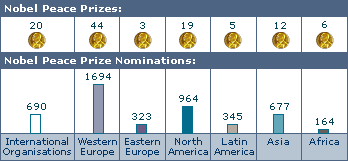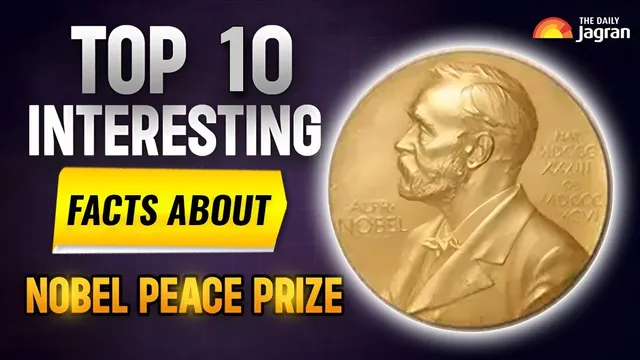- By Sarju Saran Tiwari
- Fri, 10 Oct 2025 05:36 PM (IST)
- Source:JND
Nobel Peace Prize 2025: The Nobel Peace Prize is an annual award presented to individuals or organizations for their exceptional contributions to peace. It is one of the five prizes established in the 1895 will of Swedish inventor Alfred Nobel. The prize is administered by the Norwegian Nobel Committee and awarded in Oslo, Norway.
On November 27, 1895, Alfred Nobel signed his last will, in which he dedicated the largest portion of his estate to several awards, the Nobel Prizes. As described in Nobel's will, a portion was dedicated "to the person who shall have done the most or the best work for fraternity between nations, for the abolition or reduction of standing armies, and for the convening and promotion of peace congresses." Today we present to you 10 interesting facts about the Nobel Peace Prize.
Top 10 Intresting Facts About Nobel Peace Prize:
1. Number of Nobel Peace Prizes:
106 Nobel Peace Prizes have been awarded since 1901. It was not awarded on 19 occasions: in 1914-1916, 1918, 1923, 1924, 1928, 1932, 1939-1943, 1948, 1955-1956, 1966-1967 and 1972.
2. Youngest peace laureate:
Malala Yousafzai was awarded the Nobel Peace Prize in 2014 at the age of 17 "for her struggle against the oppression of children and young people and for the right of all children to education".
3. Oldest peace laureate:
Joseph Rotblat was awarded the Nobel Peace Prize at the age of 86 “for their efforts to diminish the part played by nuclear arms in international politics and, in the longer run, to eliminate such arms”.
4. Female Nobel Peace Prize laureates:
Of the 112 Nobel Peace Prize laureates, 20 have been women. The first Nobel Peace Prize was awarded to a woman, Bertha von Suttner, in 1905 “for her audacity to oppose the horrors of war”.
5. Multiple Nobel Peace Prize Laureates:
The work of the International Committee of the Red Cross (ICRC) has been honoured the most – three times (1917, 1944, 1963) – by a Nobel Peace Prize. In addition, the founder of the ICRC, Henry Dunant, was awarded the first Nobel Peace Prize in 1901.
6. Who Declined the Nobel Peace Prize?
Vietnamese politician Le Duc Tho, who was jointly awarded the Nobel Peace Prize with US Secretary of State Henry Kissinger in 1973, is the only person to have declined the Nobel Peace Prize. The two were awarded the prize for negotiating the Vietnam Peace Accords. Le Duc Tho cited the situation in Vietnam, stating that he was in no position to accept the Nobel Prize.
7. Imprisoned Peace Prize Laureates Honored
The 2023 Nobel Peace Prize was awarded to Narges Mohammadi, an imprisoned Iranian human rights activist, for her fight against the oppression of women in Iran and her work to promote human rights and freedom. She is the fifth person to win the prize while being incarcerated.
Narges Mohammadi: Awarded the 2023 Nobel Peace Prize for her activism against the mandatory hijab and the death penalty in Iran.
Carl von Ossietzky: The 1935 winner, a German pacifist imprisoned in a Nazi concentration camp.
Aung San Suu Kyi: The 1991 winner, a Burmese politician and human rights activist.
Liu Xiaobo: The 2010 winner, a Chinese human rights activist.
Ales Bialiatski: The 2022 winner, a human rights advocate from Belarus
8. Posthumous Nobel Peace Prizes
The Nobel Peace Prize has only been awarded posthumously once, to Dag Hammarskjöld in 1961. Since 1974, a Nobel Prize cannot be awarded posthumously unless the recipient dies after the prize has been announced.
9. Nobel Peace Prizes and nominations in the first 100 years
The 109 awarded individuals and organisations over the first one hundred years of the Nobel Peace Prize (1901-2001), and the 4857 nominees, can be distributed geographically and by organisation as shown below

10. Nobel Peace Prizes Nominated But Not Awarded
The three most common searches on individuals in the Nobel Peace Prize nomination database are Adolf Hitler (1939), Mahatma Gandhi (1937, 1938, 1939, 1947) and Joseph Stalin (1945, 1948).
2025 Nobel Peace Prize:
The 2025 Nobel Peace Prize was awarded to Venezuelan opposition leader María Corina Machado.
She was recognized for her "tireless work promoting democratic rights for the people of Venezuela and for her struggle to achieve a just and peaceful transition from dictatorship to democracy".

